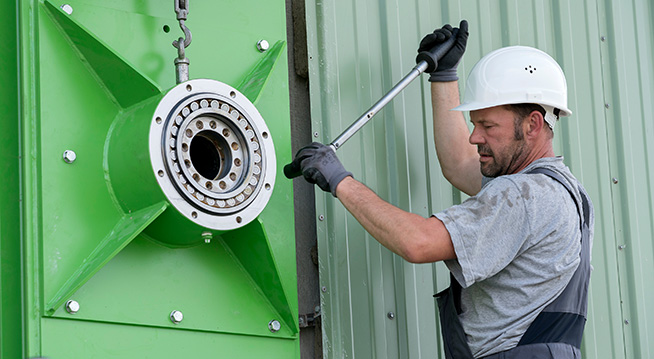
Repowering
Biogas plants are subject to wear and tear and, like all energy generation plants, are designed for a certain service life. To continue to operate older plants with economic efficiency, it is essential to take a proactive approach to the planning of modernisation and optimisation measures. In addition, there are constant changes to statutory framework conditions that open up new options for continued operation. Often even minor conversion work or modifications to the biological, technical and organisational areas are sufficient to increase overall efficiency.
Take advantage of these benefits:
- Advice on new economic opportunities due to changes to the statutory framework conditions
- Individual modernisation concept to optimise performance and yield, tailored to your plant
- Compliance with all operational safety regulations
- Extension of the lifecycle of your plant
- Increased profit through improved efficiency
Engineering
There are a range of options and no two plants are the same. We work with you to develop an individual optimisation concept for your plant. For a meaningful cost/benefit analysis, the untapped potential of the biogas plant is determined and comprehensive solutions are developed. When reviewing your processes, we draw on over 20 years of expertise.
Extension & conversion
Statutory regulations such as the German Fertilisers Regulation (DüV) often demand extensive technical retrofitting. In addition to the new build of a fermentation residue store or replacement of the gas tank, the replacement of older components with new, higher performance and more energy efficient components is playing an increasingly important role.
Together, we will find the ideal solution for your plant. Of course, we also take care of delivery, construction and installation as well as complete integration, including commissioning.
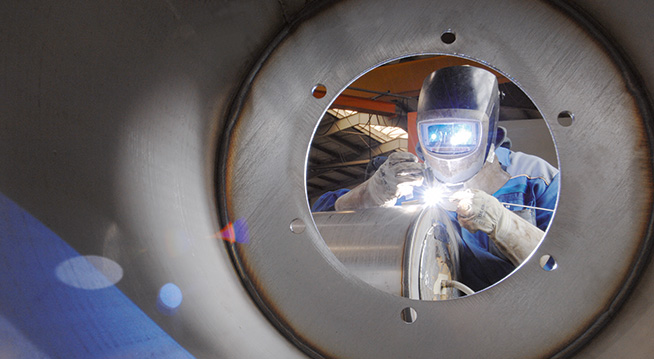
Design & approval
We guide and support your conversion from the very first consultation meeting. This includes the design, obtaining approvals as well as full support during construction. We will compile the requisite documents for you and discuss approval queries and requirements with the relevant authorities.
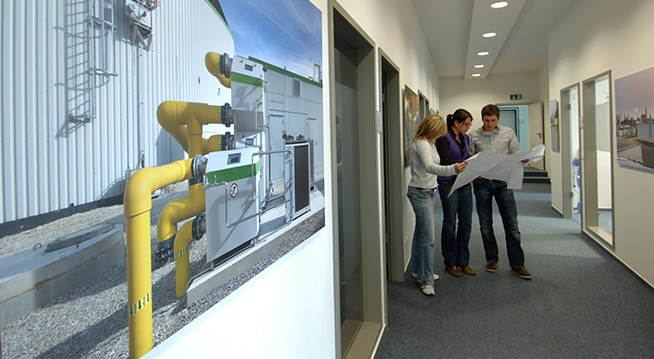
Our services in detail:
- Full approval planning (in accordance with building regulations or the German Immissions Act – BImschG)
- Coordination with all relevant authorities and experts
- Compilation of requisite documents such as fire service plans, emergency concepts, etc.
- Analysis of weak points
- Determination of key figures relevant to the process
- Development of an optimisation concept through to detailed planning
Take advantage of these benefits:
- A single point of contact and everything from a single source!
- Advice on new economic opportunities due to changes to the statutory framework conditions
- Individual planning concept to optimise performance and yield, tailored to your plant
- Compliance with all operational safety regulations
- Consideration of the latest standards and optimal process technology during design
Improved flexibility
If your CHP unit is intended to generate power according to demand, an accurate flexibility evaluation needs to be carried out. Combined heat and power units with flexible control can balance out fluctuating power production from wind and photovoltaic plants, and make their contribution to covering the residual load. We plan essential retrofitting measures taking into account the expiry of the German Renewable Energy Sources Act (EEG) at the end of 2026. With our solutions and concepts, your plant will be eligible for the government Flex incentives beyond the Renewable Energy Sources Act subsidy period. We optimise the heating concept of the entire plant, expand it where necessary to include a CHP unit and a gas tank, and develop flexible feeding and roadmap management.
Our services in detail:
- Concepts for operation of the plants under the current German Renewable Energy Sources Act (EEG) and thereafter
- Thermal evaluation of the entire plant
- Flexible feeding and roadmap management
- Addition of CHP units and gas tank
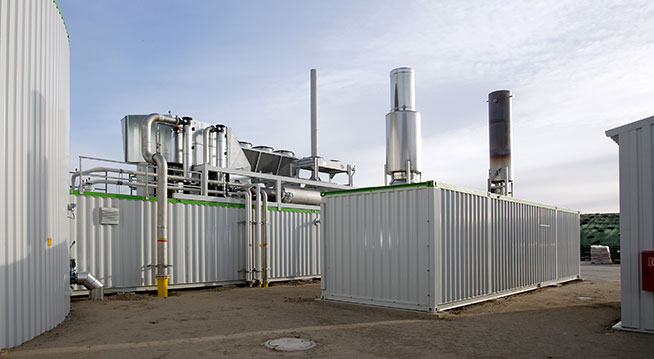
Automation of biogas plants
Remote monitoring
Checks are good, EUVIS remote monitoring is better. As the operator of a biogas plant, you usually have more important things to do than constantly monitor its performance level. That’s where the EUVIS control centre from Kanadevia Inova Schmack comes in. It is a 24 hour a day, 365 days a year service to remotely monitor your biogas plant. Our employees monitor all relevant figures and parameters of the biogas process and compare the individual values with other plants in our data pool. This allows us to identify deviations in normal operation promptly, and to respond quickly to performance fluctuations.
Our services in detail:
- Continuous monitoring 24 hours a day, 365 days a year
- Seamless recording of all process data, including gas quality, gas quantity/pressure as well as temperature and fill level
- Contactable around the clock for fault analyses and troubleshooting
Take advantage of these benefits:
- Early detection of process disruptions
- Reliable, fault-free plant operation
- Short response times
- High plant availability
- Avoidance of long downtimes
Control/control cabinets
Our BIOWATCH is an integral scalable management system that takes care of all measuring, controlling and management functions of your biogas plant. It is equipped with a control and monitoring unit for the efficient automation and monitoring of the biogas plant. The Visu L or Visu XL visualisation systems contain an operator’s log to handle automatic documentation in accordance with legal requirements.
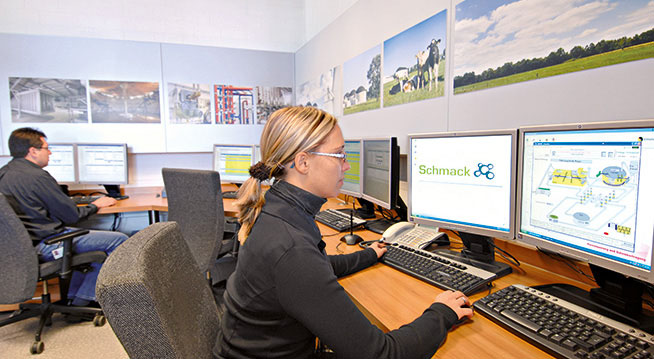
Real-life example
Equipped for the future: optimisation concept for the Ivenack biogas plant
The Mecklenburg community of Ivenack is famous for its ancient, thousand year-old oaks, which are some of the oldest in Europe. An awareness and appreciation of valuable ecosystems prompted the community to formulate a vision in which it meets all its own needs with self-generated renewable energy. In addition to the 140-kilowatt photovoltaic system, the biogas plant, which was specially constructed in 2006, is the core of a standalone power supply to the village.
Since then, the plant, which has an installed power of 626 kWel, has generated not only electricity from a substrate mix of cattle slurry (30 %) and maize & cereals (70 %), but heat for the specially constructed local heating network. The owner of the plant is BALANCE Erneuerbare Energien GmbH, a wholly owned subsidiary of the energy group VNG AG based in Leipzig.
Comprising a digester and a fermentation residue store, the plant’s capacity utilisation was at least 90 percent. Nevertheless, rising substrate prices have meant that it has been impossible to operate the plant economically in recent years.
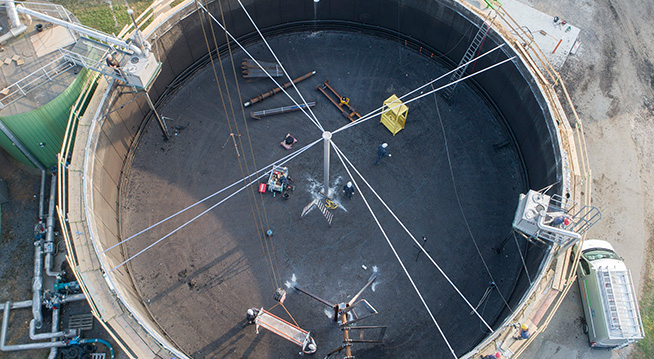
Extensive investment required – but not lucrative
The operators found a competent partner in Kanadevia Inova Schmack GmbH, which was commissioned to develop and implement a solution concept. Kanadevia Inova Schmack specialists identified potential, developed a logical optimisation concept and took steps to ensure that the plant would be futureproof and remain profitable in the long term.
Step 1
Change substrates to dry poultry manure and solid cattle manure rather than cattle slurry.
Result
Reduction in the substrate quantity and, in turn, a reduction in the fermentation and storage volume needed, thus rendering construction of an expensive fermentation residue store unnecessary.
By fermenting the stackable substrate mix, the plant, which is covered by the German Renewable Energy Sources Act (EEG) 2004, is now eligible to receive the technology bonus for dry fermentation of 2 cent/kWh. This has resulted in additional revenue of around €100,000 per year. The reduction in substrate quantity also reduces the fermentation residue storage volume.
Step 2
Extensive technical conversion for modernisation (required in part due to the TF bonus), including replacement of agitators, gas tank and chargers, as well as integration of separation into the plant technology
Result
A reduction in running costs due to significantly lower energy consumption and longer service life of the new components.
The total costs for implementation of the optimisation concept developed by Kanadevia Inova Schmack came to around €500,000, which will be amortised within just 5 years thanks to conversion to the technology bonus. Consequently, the plant is well equipped for operation until at least the expiry of the German Renewable Energy Sources Act (EEG) at the end of 2026.
